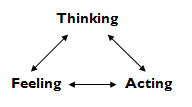When we’re feeling distressed about something or going through a difficult emotional experience it can feel like our thoughts are running out of control. Our minds start racing and we find ourselves dwelling in the past, worrying about the future, or just spinning our wheels trying to think ourelves out of our problems.
At times, our thoughts can become so powerful and consuming that it’s difficult to focus on anything else. Reading, being productive at work, or even just carrying on a conversation seems impossible. The thoughts become so persistent that nothing can distract us from them and nothing else can hold our attention, and it can feel like there isn’t anything we can do to slow down these thoughts or get some peace of mind.
Because it’s natural to want thoughts like these to go away and to have some control over what’s going on inside our heads, we often wind up trying to will these thoughts away and shut them out completely. But just like we can’t control our emotions, nor suppress our emotions, neither can we control or suppress our thoughts.
 Usually the more we fight our thoughts and try to block them out or force them to go away, the stronger we make them and the more resolute they become. However, when our thoughts start racing, we get stuck ruminating, or we just can’t quiet down our minds, there are a few strategies we use to calm our thinking.
Usually the more we fight our thoughts and try to block them out or force them to go away, the stronger we make them and the more resolute they become. However, when our thoughts start racing, we get stuck ruminating, or we just can’t quiet down our minds, there are a few strategies we use to calm our thinking.
A cognitive therapy (CBT) approach to calming our thoughts entails examining and challenging the thoughts we’re having to find some alternative ways of thinking about the situation. This can involve things such as positive reappraisal, or reframing a negative event in a more positive light, or putting things into perspective and considering the negative event or emotion in a broader context that makes it easier to manage.
A mindfulness approach entails accepting the presence of these thoughts, and, as best you can, simply letting go of them. In the remainder of this post we’ll look at some CBT techniques to deal with negative thinking. In another post we’ll look at how to let go of negative and racing thoughts with mindfulness.
In cognitive therapy we learn to assess negative thoughts when they arise, rather than taking them for granted as being true, and considering if there might be other ways of looking at a situation. Asking yourself some of the following questions, grouped below into three categories, can help you to reframe a distressing situation and see it in a different light.
By taking the time to ask these questions, you can disrupt the thinking-in-cirlces pattern that typically occurs when we allow negative thinking to go unchallenged. Asking these questions gives you the opportunity to step back from your thoughts a little, slow down your mind, and consider things from a fresher and calmer perspective.
What are the facts?
- How do I know that my thought is true? What is the evidence (or proof) that my thought is true?
- Is there any evidence that disproves my thought? What’s the evidence that this thought might not be true, or not completely true?
- Are there facts that I’m ignoring or I’ve overlooked?
- Am I using any words or phrases that are extreme or exaggerated such as always, never, forever, should, must, can’t, etc.?
- Are there any small things that contradict my thought that I might be discounting as unimportant?
Are there any other possible explanations?
- Can I see any other way of viewing this?
- If my best friend or someone I loved had this thought, what would I tell them?
- If my best friend or someone who loves me knew I was thinking this thought, what would they say to me?
- What evidence would my friend point out to me that would suggest that my thought is not 100% true?
- When I am not feeling this way, do I think about this type of situation any differently? How?
- Five years from now, if I look back at this situation, might I look at it any differently?
- Am I blaming myself for something over which I do not have complete control?
- Have I had experiences that show that this thought is not true all the time?
- Are there any strengths in me that I’m ignoring?
- Are there any positives to the situation that I’m ignoring?
What can I do to help me deal with the situation?
- Have I been in this type of situation before? What have I learned from prior experiences that could help me now?
- When I have felt this way in the past, what did I think about that helped me feel better?
- What is the worst that could happen?
- What is the most likely thing that will happen?
- If the worst did happen, what would I be able to do to cope?
- What is the effect of thinking this way?
- Will this view help me to deal with the problem? Would another view be more helpful?
Once you’re able to gain a broader perspective, things tend not to be as overwhelming, your mind quiets down, and you can start to see things more clearly. Once you have some clarity, then you can find concrete ways to deal with whatever is troubling you.
Often it helps to actually write out your answers to these questions, as writing thoughts down helps get them out of your head and slow down your mind. And seeing the answers written out in front of you can make them sink in and seem more real than if they are just more thoughts added to whatever is going on in you mind already.
This technique can be particularly helpful when you’re worrying a lot. In another post we look at a similar set of questions you can ask yourself to help reduce worrying and catastrophic thoughts.





